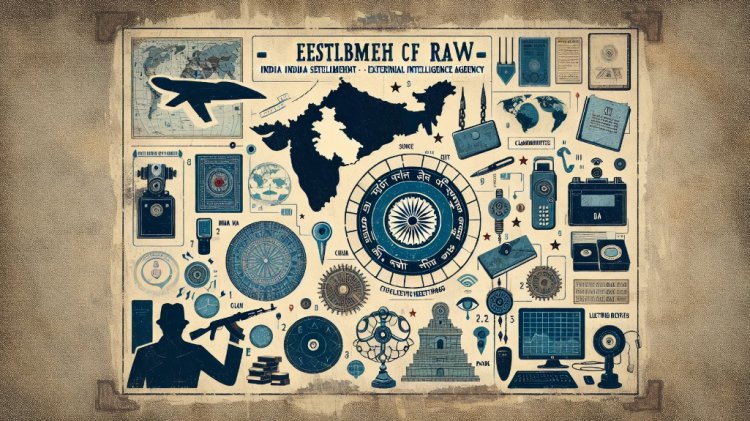How and Why Was RAW Created?
Unravel the intriguing history of India's external intelligence agency, RAW. This article explores the circumstances and motivations behind its creation, delving into the pivotal events and key figures that shaped its inception in 1968

Introduction
In this blog post, we will explore the creation and history of RAW, the Research and Analysis Wing, India's external intelligence agency. We will delve into the reasons behind its establishment, its structure and function, as well as its role in shaping India's foreign policy. Let's dive in!
The Weak Performance of the Intelligence Office
The primary reason for the creation of RAW was the weak performance of the intelligence office during the battles against China in 1962 and Pakistan in 1965. These failures highlighted the need for a dedicated external intelligence agency with a specific focus on gathering intelligence on China and Pakistan.
The History of RAW
Prior to the establishment of RAW, the Intelligence Bureau was responsible for both internal and external intelligence in India. However, after the China conflict, it became clear that a separate agency was needed to handle external intelligence. RAW was founded in 1968 as a branch of the Chief Intelligence Service with a staff of 250 members and an annual budget of around 20 million dollars.
Under the leadership of Rameshwar Nath Kao, RAW's first leader, the agency experienced initial successes. However, it has also faced criticism for its lack of coordination with domestic intelligence and security agencies, weak analytical capabilities, and lack of transparency.
The Structure and Function of RAW
The exact structure of RAW remains largely unknown. It started with 250 personnel and has since expanded to several thousand, although its staffing and budget remain a secret. RAW reports directly to the Prime Minister instead of the Ministry of Defence, unlike the CIA or MI6.
RAW's objectives have evolved over time to include monitoring political and military developments in neighbouring countries, securing India's national security, and influencing its foreign policy. The organisation also works to limit the supply of military hardware to Pakistan from European countries, the United States, and China.
RAW's Role in Bangladesh, Myanmar, and Sri Lanka
RAW played a significant role in the formation of Bangladesh, providing intelligence, training, and arming the Mukti Bahini group. It also facilitated Sikkim's accession to India in 1975 and provided military assistance to groups opposing the pro-China regime in Myanmar.
The agency faced criticism for its support of the Tamil separatist group, the LTTE, in Sri Lanka. RAW initially trained and armed the LTTE but withdrew support when the group's terrorist activities escalated in the 1980s. RAW's involvement in Sri Lanka ultimately led to the assassination of Prime Minister Rajiv Gandhi in 1991.
Covert action in Afghanistan and Pakistan
RAW has maintained a close relationship with KHAD, the Afghan intelligence agency, since its creation. This relationship was strengthened in the early 1980s through trilateral cooperation involving RAW, KHAD, and the Soviet KGB. RAW and KHAD worked together to monitor Sikh militants in Pakistan's tribal areas.
Relations with the CIA
The CIA played a role in the creation of RAW, and India's intelligence relations with the CIA predate the establishment of RAW. After the war with China in 1962, the CIA provided training to Indian operatives for deep-penetration terror operations in China.
Weaknesses in RAW
The 1999 intrusion of Pakistan-backed armed forces into Jammu and Kashmir highlighted weaknesses in RAW's efficacy. While RAW officials argued that they had provided the intelligence, the political leadership failed to act upon it. This prompted the formation of review committees that recommended remedial measures, including the establishment of the National Technical Research Organisation (NTRO) and the Defence Intelligence Agency (DIA).
Despite the shakeup of the intelligence apparatus, some issues still persist, such as the overlap of agency activities. Previously, RAW was the only organisation authorised to conduct espionage operations abroad, but now the Intelligence Bureau and DIA also have this authority.
Conclusion
RAW, India's external intelligence agency, was created in response to the weak performance of the intelligence office against China and Pakistan. Over the years, RAW has expanded its objectives and played a significant role in shaping India's foreign policy. Despite some weaknesses and criticisms, the agency continues to play a crucial role in safeguarding India's national security and influencing its relations with neighbouring countries.



 admin
admin 










